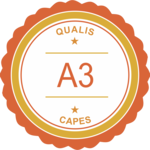Declaração de Ética
Declaração de ética e código de conduta na publicação
A Revista Ágora Filosófica, empenhada em manter a qualidade científica e os padrões de ética no processo editorial, adota as normas do Conselho Nacional de Pesquisa (CNPq) contidas no Relatório da Comissão de Integridade de Pesquisa do CNPq e as normas do Commitee of Publication ethics (COPE) estabelecidas no Code of Conduct and best practice guidelines. Os expedientes adotados para estimular a integridade na produção e publicação dos resultados da investigação filosófica, pesquisa científica em Ciências Humanas, estão fundamentados nos documentos supra citados. São eles: 1) ações preventivas (instruções de responsabilidade do/a autor/a, do Editor/Comissão Editorial, instruções aos Pareceristas ad hoc); 2) orientações contra más condutas.
Ágora Filosófica é um periódico vinculado ao Programa de Pós-graduação em Filosofia da Universidade Católica de Pernambuco (UNICAP), e assume as políticas e os procedimentos editoriais da Instituição. A UNICAP zela por seu veículo de pesquisa e divulgação filosófica, estimulando a publicação de qualidade acadêmica. Ao buscar a integridade e a transparência de suas atividades, a Ágora Filosófica torna público, mediante difusão por página web sua ética de publicação.
AÇÕES PREVENTIVAS
Responsabilidades do(s) Editor(es) e da Comissão Editorial
São responsabilidades do(s) Editor(es) e da Comissão Editorial:
- Definir os temas para cada número, divulgá-los na comunidade científica e encaminhar convites a autores reconhecidamente especialistas no tema escolhido;
- Manter atualizada a política editorial e as normas para publicação na Revista, assegurando a eficácia dos seus diferentes processos e solicitações de órgãos avaliadores, pontos de vistas dos leitores, autores, membros dos comitês, pareceristas e equipe de trabalho;
- Acompanhar o processo de submissão/avaliação dos manuscritos. Após a etapa de submissão, verificar a pertinência dos textos submetidos, bem como o cumprimento das normas editoriais da Revista pelos autores. Encaminhá-los, em primeira instância, a uma avaliação interna junto à Comissão Editorial, submissão do artigo a um aplicativo de verificação de plágio, análise sobre a relevância, a qualidade metodológica e científica do texto. Em segunda instância, o artigo será submetido à avaliação por pares anônima;
- Selecionar adequadamente os/as pareceristas externos e orientá-los/as sobre o que se espera do processo de avaliação por pares (Double blind peer review): uma avaliação justa e imparcial;
- Assegurar o cumprimento dos procedimentos adequados para avaliação dos manuscritos recebidos, zelando junto à comissão editorial e aos pareceristas ad hoc, pela transparência, a qualidade científica, a confidencialidade dos profissionais envolvidos no processo avaliativo e organizacional do Periódico;
- Decidir pela aceitação ou rejeição dos artigos submetidos com base nos pareceres dos avaliadores. A decisão é orientada pelas normas da Revista indicadas nas “Diretrizes aos Autores”;
- Realizar a editoração do artigo após sua aprovação e autorização por parte do/a autor/a, adaptando o manuscrito original aos padrões e estilos do Periódico;
- Responder com prontidão as reclamações, queixas de autores, leitores e membros dos comitês da Revista, atendendo a situações que tenham dado margem a expressões de insatisfação. Adotar ações que são de direito contra qualquer forma de apropriação indevida do trabalho intelectual.
Para cumprir as responsabilidades acima, a Comissão Editorial se vale das seguintes prerrogativas:
- Averiguar se o texto é original, inédito ou exclusivo;
- Conferir se o manuscrito estar redigido na língua original precedido pelo título, resumo e palavras-chave no idioma original e em inglês. O texto submetido em inglês deverá ser precedido pelo título, resumo e palavras-chave em português, além das Referências, nos metadados e no texto completo;
- Se o texto possui introdução, desenvolvimento e conclusão, com suas devidas citações;
- Ilustrações e gráficos deverão estar no corpo do texto;
- Autoria: nome completo, vinculação institucional, país, resumo bigráfico e ORCID (apenas nos metadados do sistema);
- Texto escrito em formato Word;
- Trabalho com citações e referências de acordo com as normas técnicas ABNT;
- Antes de encaminhar o texto para o processo de avaliação por pares, verificar se há alguma identificação de autoria ou vinculação institucional;
- Co-autorias: informações completas de ambos os autores, para contato da comissão editorial.
Responsabilidades dos/as autores/as
São responsabilidades dos/as autores/as:
- Responsabilizar-se pela garantia da veracidade das informações (dados, conteúdos e conclusões) contidas no manuscrito submetido à Revista Ágora Filosófica pela garantia da originalidade e a prioridade da publicação ao Periódico conforme indicado nas “Instruções aos Autores”;
- Declarações/afirmações fraudulentas, imprecisas, problemas de autoria ou de desonestidade intelectual, plágio são inaceitáveis;
- A autoria e/ou a co-autoria do texto deve ser limitada a quem de fato contribuiu significativamente para a realização do trabalho apresentado;
- Zelar pela troca de informações com a Revista e/ou pelo site da mesma: acompanhando o processo de avaliação do artigo;
- Assumir os critérios indicados nas “Diretrizes para Autores” quanto às normas técnicas a serem observadas na disposição gráfica dos artigos (título, resumo, abstract, palavras-chave, Keywords...);
- Identificar quando houver instituições de fomento que patrocina a pesquisa geradora do artigo;
- Revisar as correções sugeridas pelos avaliadores e acolhida pela Comissão Editorial, aprovando-as ou rejeitando-as. Caso decida por alterar as eventuais sugestões, os ajustes seguirão os critérios adotados pela revista. A partir da aprovação das correções realizadas não são permitidas novas alterações no texto por parte dos/as autores/as;
- Ao submeter o manuscrito, os autores terão que aceitar a Declaração de Diereito Autoral para Periódicos de acesso aberto;
- Notificar os editores sobre possíveis imprecisões, equívocos e/ou pontos problemáticos relacionados ao conteúdo do artigo submetido e/ou publicado, cooperando para que seja feita uma retratação pelo autor (em caso de plágio e/ou dados falsos) e uma errata pelo Editor;
- Os autores devem estar cientes que a submissão de um manuscrito não implica necessariamente na sua publicação pela Revista Ágora Filosófica.
Responsabilidades dos/as pareceristas ad hoc
Cabe aos pareceristas:
- Subsidiar o Editor e a Comissão Editorial nas decisões relativas aos manuscritos submetidos, arbitrando sobre a qualidade científica dos mesmos, indicando reformulações quando necessárias para o aprimoramento dos textos.
- Zelar pelo cumprimento do prazo para avaliação (21 dias). Na impossibilidade de cumprir o prazo estipulado, comunicar imediatamente ao Editor para que o mesmo busque outros pareceristas em tempo hábil.
- Emitir pareceres fundamentados, claros e objetivos sobre a relevância do tema, sua adequação às normas e à missão da revista, sua estrutura, aspectos formais, etc.
- Assegurar a confidencialidade dos textos apresentados pelos editores.
- Notificar ao Editor os casos de violação de direitos autorais e/ou de plágio.
Declaração sobre autoria e ferramentas de Inteligência Artificial (IA)
A Ágora Filosófica está em conformidade com as recomendações do COPE (Committee on Publication Ethics) para o estabelecimento de procedimentos éticos na publicação científica.
Este periódico reconhece que a utilização de ferramentas de inteligência artificial (IA) como ChatGPT , Bard do Google, Copy.ai e Large Language Models, dentre outras, está se expandindo rapidamente em publicações de pesquisa. Deste modo, juntamo-nos ao referido COPE e toda a comunidade científica para afirmar que as ferramentas de IA não podem ser listadas como autoras de um artigo nesta Revista.
As ferramentas de IA não atendem aos requisitos de autoria, pois não podem assumir a responsabilidade pelo trabalho submetido. Como entidades não jurídicas, elas não podem afirmar a presença ou ausência de conflitos de interesse nem gerenciar contratos de direitos autorais e licenças.
Os autores que utilizam ferramentas de IA na redação de um manuscrito, devem usar de transparência informando qual a ferrramenta de IA utilizada e o que foi produzido com a mesma na seção de procedimentos metodológicos. Portanto, é de responsabilidade do autor o conteúdo de seu manuscrito, bem como, as partes produzidas por uma ferramenta de IA, e qualquer violação que ocorra referente à ética de publicação.
ORIENTAÇÕES CONTRA MÁS CONDUTAS
Plágio e verificação de similaridades
De acordo com o Relatório da Comissão de Integridade de Pesquisa do CNPq, plágio consiste na apresentação, como se fosse de sua autoria, de resultados ou conclusões anteriormente obtidos por outro autor, bem como de textos integrais ou de parte substancial de textos alheios sem os cuidados detalhados nas Diretrizes. Comete igualmente plágio quem se utiliza de ideias ou dados obtidos em análises de projetos ou manuscritos não publicados aos quais teve acesso como consultor, revisor, editor, ou assemelhado. Por sua vez, o autoplágio consiste na apresentação total ou parcial de textos já publicados pelo mesmo autor, sem as devidas referências aos trabalhos anteriores.
A Ágora Filosófica verifica os conteúdos a partir de análise de um editor habilitado, por meio do sistema de arbitragem, bem como através de verificação de similaridades, utilizando o software CopySpider, protegido pelas leis internacionais de direitos autorais e marca registrada.
















